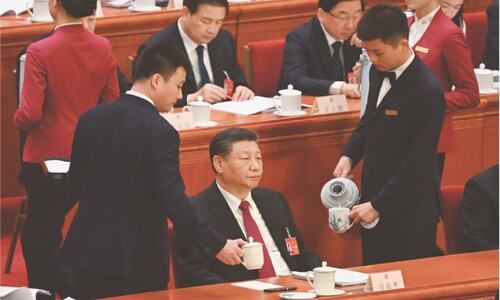BEIJING: As Beijing toughens its stance on Taiwan, it will increase defense spending by 7.2% this year, supporting a military budget that has more than doubled under President Xi Jinping’s 11 years in office, according to official media on Tuesday.
This year’s increase is far higher than the government’s predicted rate of economic growth, and it is consistent with the pace reported in the previous year’s budget. Along with releasing the budget statistics, China also formally adopted harsher language against Taiwan, eliminating any reference to “peaceful reunification” from a government report Premier Li Qiang presented at the National People’s Congress (NPC) opening on Tuesday.
As regional military deployments increase, tensions have escalated considerably in recent years over Taiwan, the democratically run island that China claims as its own, as well as other parts of East Asia.
Taiwan is a significant factor in Beijing’s defense spending, according to Li Mingjiang, a defense specialist at the Rajaratnam School of International Studies (RSIS) in Singapore, despite China’s faltering economy.
Tokyo expresses strong international worries over defense spending and calls on Beijing to be more transparent.
According to Li, “China is demonstrating that it wants to expand its military over the next ten years to the point where it is ready to win a war if it has to fight one.” The defense budget has increased dramatically since Xi assumed office over ten years ago, from 720 billion yuan in 2013 to 1.67 trillion yuan ($230 billion) this year.
Throughout his administration, the percentage increase in military spending has continuously surpassed the annual goal for domestic economic development. According to the government report, this year’s growth target for 2024 is roughly 5%, which is comparable to the aim from the previous year.
China’s neighbors and the US keep a careful eye on the defense budget because they are concerned about Beijing’s military build-up and strategic goals.
Chinese defense spending has increased for 30 years running, according to data from the London-based International Institute for Strategic Studies (IISS). This year’s budget represents this trend.
Speaking on behalf of the Japanese government, Yoshimasa Hayashi warned of grave worries on the international scene and encouraged Beijing to be more transparent. In Tokyo, Hayashi stated that China’s unrelenting rise in military spending without enough openness posed “the greatest strategic challenge ever to ensure the peace and stability of Japan and the international community and strengthen international order.”
The defense ministry of South Korea chose not to respond. A request for comment was not immediately answered by Australia’s defense ministry. According to James Char, a security scholar at the RSIS, the defense budget has not put any strain on the national coffers during the past ten years, even though it has outpaced GDP growth. It has maintained at roughly 1.3 percent of the gross domestic product.
“Obviously, whether this can be sustained going forward will depend on the nation’s longer-term economic fortunes,” Char stated.








